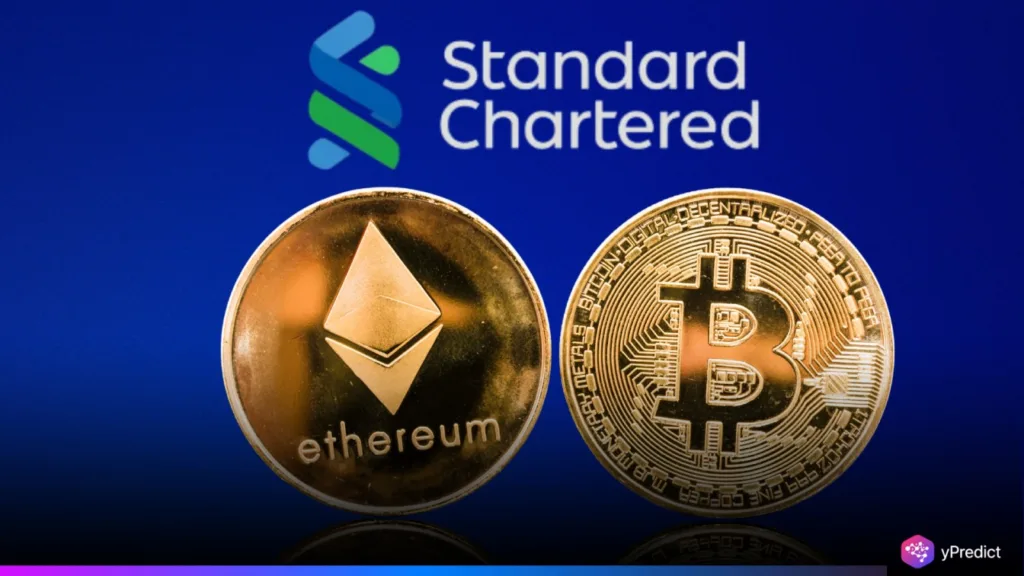
Standard Chartered has officially joined the institutional crypto trading business and launched services for Bitcoin and Ethereum. The bank’s announcement marks the next step in a journey initiated in June 2024 with the launch of its crypto services, followed by Standard Chartered’s recent receipt of a digital asset license in Luxembourg. With this new offering, Standard Chartered further demonstrates its commitment to regulated digital finance, meeting the increasing demand for institutional-grade crypto infrastructure.
The announcement is about trading but AI can operate in the background—creating processes and systems that are secure, compliant and scalable. This demonstrates a strong shift toward institutional adoption of crypto services where AI is a critical driver of regulatory clarity and operational effectiveness.
From Fines to Forward-Looking Strategy
Standard Chartered’s shift into crypto comes more than a decade after its $340 million fine in 2012 for Iran-linked transactions. This time, the bank is not taking blind risks. Instead, it is using AI tools to embed risk management and compliance into its crypto service framework from day one. The Luxembourg digital asset license serves as more than a regional gateway—it is a signal that the bank wants to operate under tight regulatory oversight. AI now allows for the simultaneous monitoring of crypto transactions, limiting exposure to illicit activity, while enhancing audit tracers.
It is a tactical move that follows a longer-term objective of using AI to ensure that every step of the process from and through to onboarding clients to executing trades is compliant with current potential global standards. By implementing AI driven protections, Standard Chartered is trying to rebuild trust while consolidating its competitive advantage in a race to be a legitimate player in the digital finance arena. The fact that it is only targeting institutional clients only serves to demonstrate that this is not another retail-seeking bank chasing retail hype, but rather a bank focused on legitimacy and scale.
Institutional Adoption Gains Speed
Standard Chartered’s timing aligns with a growing trend: banks worldwide are expanding into crypto. A 2023 IMF report shows a 50% rise in global bank participation in crypto markets since 2020. The report links this spike to better compliance tools and increased institutional demand. AI makes this possible. Institutions require more than access — they need reliability, low latency execution, and full visibility into regulatory requirements.
Standard Chartered uses AI to provide real-time trade analytics, automated reporting and highly scalable transaction verifications. Establishing a new crypto trading desk is much more than another digital finance offering, it is a clear response to institutional demand for trusted onramps. As this demand accelerates, AI enabled operations will allow Standard Chartered deliver high volumes of quality service without sacrificing accuracy or transparency.
Compliance-Led, AI-Driven Execution
Standard Chartered is pursuing a compliance-first strategy, something that many early entrants in crypto experienced significant challenges with due to regulatory hurdles. The Bank’s compliance-first approach is being enhanced by artificial intelligence that automates many due diligence components, including real-time KYC, and scanning transactions for suspicious behavior. The technology supports the bank’s flexibility in responding quickly to changing regulations and regulatory policy across jurisdictions. By embedding AI into its crypto service stack, the bank eliminates many manual compliance risks.
Institutional investors can trade Bitcoin and Ethereum knowing that backend systems are built for security, accountability, and traceability. Standard Chartered’s use of AI ensures the digital asset desk remains agile yet fully transparent. It positions the bank to meet both regulatory demands and client expectations in a rapidly evolving financial environment. This is not a trial run, it’s an AI-backed infrastructure built to scale.
AI Infrastructure Supports Future Expansion
While the headline is about Bitcoin and Ethereum trading, the foundation being laid runs deeper. AI enables Standard Chartered to develop a full suite of institutional crypto services, from asset custody and settlement to liquidity provision and risk modeling. The Luxembourg license acts as a launchpad, but AI allows global expansion. Machine learning models help assess risk profiles, forecast market activity, and offer predictive insights for clients.
These tools give Standard Chartered a long-term edge as it scales crypto services beyond trading. What we are witnessing is not a cautious experiment but a deliberate digital transformation. AI drives every part of Standard Chartered’s new crypto arm from operations to compliance, from client service to internal governance. This is how institutional adoption becomes not only feasible but sustainable.






